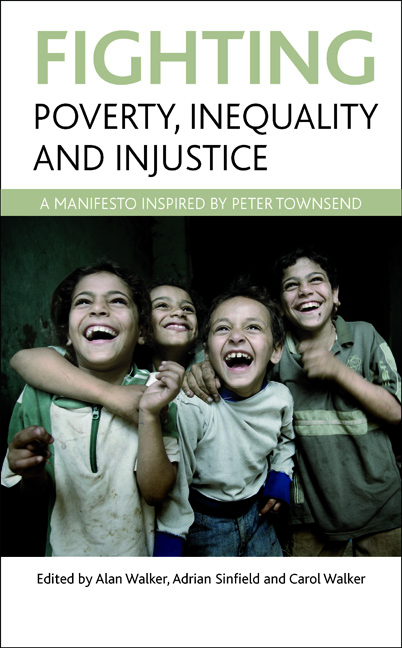Book contents
- Frontmatter
- Dedication
- Contents
- List of figures and tables
- Preface
- Notes on contributors
- one The legacy of Peter Townsend
- two The making of a pioneer researcher: reflections from Peter Townsend’s life story
- three Peter Townsend, a man ahead of his time: re-reading The family life of old people and The last refuge
- four The case for universal child benefit
- five Poverty
- six Social justice for children: investigating and eradicating child poverty
- seven For universalism and against the means test
- eight Underclass, overclass, ruling class, supernova class
- nine Addressing health inequalities: building on Peter Townsend’s legacy
- ten Towards a new sociology of ageing: from structured dependency to critical gerontology
- eleven Disability: prospects for social inclusion
- twelve Putting the lawyers in their place: the role of human rights in the struggle against poverty
- thirteen Radicalising social policy in the 21st century: a global approach
- fourteen Conclusion: building on the legacy of Peter Townsend
- Index
four - The case for universal child benefit
Published online by Cambridge University Press: 01 September 2022
- Frontmatter
- Dedication
- Contents
- List of figures and tables
- Preface
- Notes on contributors
- one The legacy of Peter Townsend
- two The making of a pioneer researcher: reflections from Peter Townsend’s life story
- three Peter Townsend, a man ahead of his time: re-reading The family life of old people and The last refuge
- four The case for universal child benefit
- five Poverty
- six Social justice for children: investigating and eradicating child poverty
- seven For universalism and against the means test
- eight Underclass, overclass, ruling class, supernova class
- nine Addressing health inequalities: building on Peter Townsend’s legacy
- ten Towards a new sociology of ageing: from structured dependency to critical gerontology
- eleven Disability: prospects for social inclusion
- twelve Putting the lawyers in their place: the role of human rights in the struggle against poverty
- thirteen Radicalising social policy in the 21st century: a global approach
- fourteen Conclusion: building on the legacy of Peter Townsend
- Index
Summary
The story so far
Forty years ago, the Child Poverty Action Group (CPAG), led by Peter Townsend and Frank Field, was campaigning – as it had since its inception – for a substantial increase in family allowances. There were signs in 1970 that this campaign was bearing fruit. In its election manifesto, the Conservative Party had pledged to ‘deal with family poverty’, and its Treasury spokesman had talked about the need to raise family allowances. However, the incoming Conservative government decided instead to introduce Family Income Supplement (FIS), an income-tested benefit for low-paid working families with children. Under FIS, families where the head was in full-time work could claim payments equal to half the difference between their gross income and the prescribed amount.
Hopes for a substantial increase in family allowances having been dashed, in a special issue the next year on ‘Poor people and the Conservative government’, Poverty carried an article by Peter and myself on ‘The advantages of universal family allowances’ (Townsend and Atkinson, 1971) – the only joint article that we wrote. The article compared the new FIS with the CPAG proposals of raising family allowances and eliminating child tax allowances. The CPAG proposal would, in its more generous version, have raised the family allowance for all children (including the first child) to around 15% of mean gross income per person (gross income includes wage and salary income, income from self-employment, income from capital and state and private transfers). In the article, we argued that the CPAG route was the right one to follow in the long term and that it would ‘lay the foundation for equitable social and fiscal policies affecting families with children’ (Townsend and Atkinson, 1971, p 21).
The CPAG campaign did bear fruit only four years later, with the introduction of Child Benefit by the Labour government elected in 1974. Child Benefit, a tax-free benefit paid for all children at the same rate, replaced Family Allowance and (from 1979) Child Tax Allowance. As it was put by Barbara Castle, then Secretary of State for Social Services, ‘we shall have for the first time a single universal system of family support’ (House of Commons debate, Hansard, 13 May 1975, col 334).
- Type
- Chapter
- Information
- Fighting Poverty, Inequality and InjusticeA Manifesto Inspired by Peter Townsend, pp. 79 - 90Publisher: Bristol University PressPrint publication year: 2011
- 1
- Cited by



